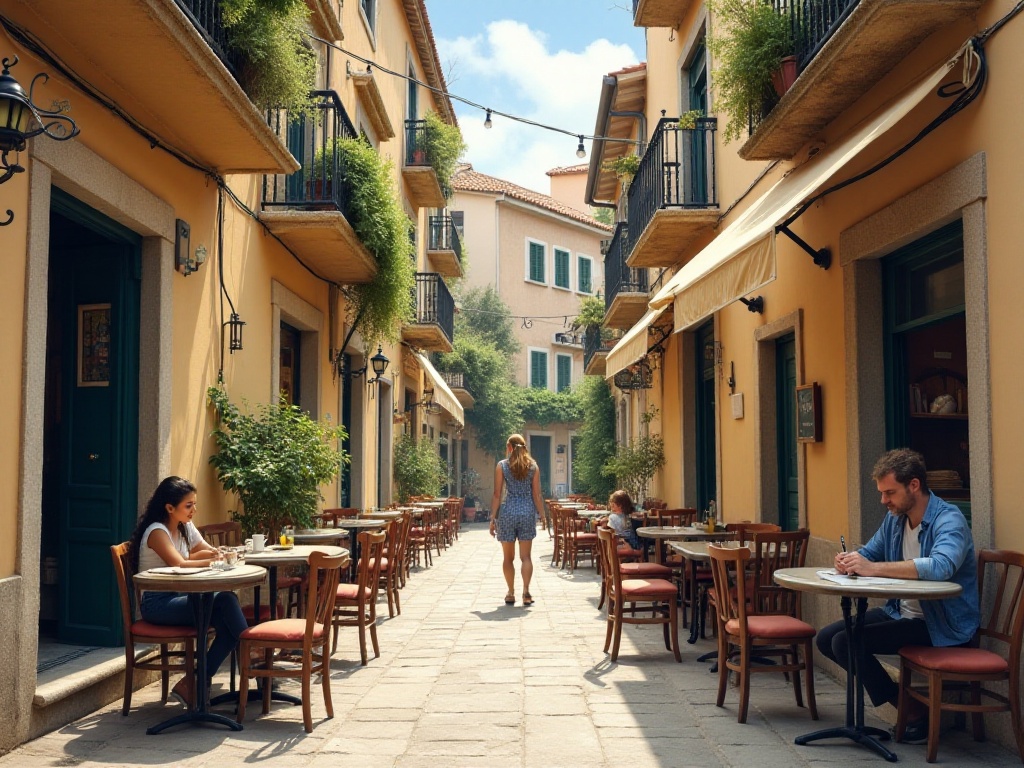I remember when I first set foot in Ubud, Bali three months ago. The air was filled with unique fragrances of spices and tropical fruits, with coconut palms swaying in the distance and traditional Balinese architecture lining the streets. As a digital nomad who had just left mainland China, I began my life in Ubud with a mix of excitement and uncertainty.
The pace of life here is completely different from big cities. In the morning, when the first rays of sunlight pierce through the rainforest canopy, you're awakened by natural sounds outside your window—not by an alarm, but by tropical birdsong and the rustling of wind through rice paddies. I quickly fell in love with this natural rhythm of life.
Ubud is a paradise for digital nomads, offering not only high-speed internet and comfortable work environments but also a rich artistic atmosphere and deep cultural heritage. Art shops, galleries, and craft studios line the streets, filling this small town with creativity and inspiration.
My accommodation is just a 15-minute walk from the Ubud Market. Every morning, I see locals in traditional dress carrying offerings to temples. Their pace of life seems slow but is full of ritual and devotion. This cultural atmosphere has subtly influenced me, leading me to reconsider the meaning of life.
Finding a house in Ubud requires patience and wisdom. I spent two full weeks visiting over a dozen properties before finding my current ideal home.
First, Ubud's housing market is divided into online and offline channels. Online options include Facebook groups (like Ubud Housing, Ubud Rentals) and various rental apps, while offline options involve local agents or walking around looking for "For Rent" signs.
During my search, I discovered significant rent variations between different areas. For example, a one-bedroom villa with a pool in central Ubud costs at least 15 million IDR per month. However, in the slightly off-center Penestanan area, a villa with similar features might only cost around 10 million IDR.
The villa I ultimately chose is in the Penestanan area, an 80-square-meter one-bedroom unit. It comes with a small pool, rice field views from both the living room and bedroom, and a balcony area suitable for working. The villa owners are a friendly Balinese couple who live nearby and are always available to help.
When renting, pay special attention to these points: First is the internet issue—always test the speed in person. From my experience, even if the landlord claims to have high-speed internet, you should test it yourself using speedtest. Second is the surrounding environment—check if it's near temples or rooster farms, as morning chanting and rooster calls might affect your sleep. Finally, check the completeness of basic infrastructure, including air conditioning, water heaters, and kitchen equipment.
My rent includes twice-weekly cleaning service and once-weekly garden maintenance, which is common in Ubud. However, utilities are extra, typically ranging from 1-1.5 million IDR per month. The landlord thoughtfully provided a water dispenser, saving me the trouble of buying water frequently.
As a digital nomad, stable internet is essential. While Ubud's internet infrastructure has improved rapidly in recent years, it's still advisable to have multiple backup plans.
My primary internet comes from the landlord's fiber optic broadband, with speeds between 50-70Mbps download and around 30Mbps upload, generally sufficient for video conferences and file transfers. However, the network can be unstable during rainy season, so I also have an XL 4G plan as backup.
I chose XL's 100GB monthly package for 300K IDR (about 150 RMB), which has good coverage. Sometimes I work by the rice fields with my laptop, and that's when the mobile hotspot comes in handy.
Besides basic internet, I also have a portable 4G router for when all networks are unstable. This device supports multiple SIM cards and automatically switches to the strongest network, serving as my ultimate backup plan.

Ubud offers rich working environments, from high-end coworking spaces to artistic cafés, providing suitable workplaces for everyone.
I frequently visit Hubud, arguably Ubud's most famous coworking space. While the daily pass at 250,000 IDR isn't cheap, the social atmosphere and facilities are excellent. The workspace is divided into quiet and social areas, allowing you to choose based on your needs. Each workstation is equipped with an ergonomic chair, high-speed internet, and uninterrupted power supply.
Besides Hubud, I often work at popular cafés. For instance, Seniman Coffee offers top-quality coffee and a great work environment. A latte costs about 40,000 IDR, and you can stay all morning. F.R.E.A.K Coffee has outdoor seating with great views, allowing you to work while enjoying rice field scenery.
However, working in cafés requires some consideration. It's best to avoid lunch hours when it gets noisy. Also, check the location of power outlets, as some cafés don't have convenient access. I usually arrive around 9 AM when it's less crowded and I can choose the best spots.

Ubud's food scene has been one of my most pleasant surprises. You'll find not only authentic Indonesian cuisine but also dishes from around the world. Best of all, the prices are very reasonable.
My typical eating routine is as follows: Breakfast at home, usually oatmeal or a sandwich. For lunch, I visit local warungs (small restaurants) for Indonesian food, where nasi goreng (Indonesian fried rice) with an egg costs only 30,000 IDR. For dinner, I choose specialty restaurants, like vegetarian or fusion restaurants.
Among the many restaurants, I highly recommend:
Clear Cafe: An elegant restaurant focusing on healthy cuisine. Their salads and juices are very fresh, with prices ranging from 80,000-150,000 IDR.
Warung Biah Biah: An authentic Indonesian restaurant known for their fried chicken and curry. Very affordable, with a good meal costing around 50,000 IDR.
Locavore To Go: The casual offshoot of the Michelin-starred Locavore. Their sandwiches and salads are exquisite. Though pricier than local restaurants, it's definitely worth it.
If you want to cook, Ubud has many shopping options. The traditional morning market offers fresh tropical fruits and vegetables at very reasonable prices. For imported ingredients, there's Pepito supermarket, which is more expensive but well-stocked.

Living in Ubud, the greatest reward has been deeply experiencing Balinese culture. The cultural atmosphere is rich, with different ceremonies and celebrations almost daily.
I remember my first full moon celebration: the entire village was decorated with lights, the air filled with the fragrance of spices and flowers. Locals in traditional dress carried offerings to temples. In the evening, there were traditional dance performances, with dancers moving gracefully and rhythmically, completely immersing viewers in this mysterious atmosphere.
Besides attending celebrations, I also enrolled in cultural experience courses. For example, in traditional dance classes, teachers not only teach dance moves but also explain the cultural significance behind each movement. The flower-arranging workshop was also interesting, helping me better understand the Balinese pursuit of beauty through weaving flowers.
Here, you can feel the presence of culture at any time. Every morning, locals place offerings in front of their doors—small baskets made from banana leaves containing flowers, fruits, and cigarettes, said to be offerings of gratitude to the spirits. Walking down the street, you'll see many people in traditional dress, either going to temples to pray or participating in ceremonies.
In Ubud, motorcycles are the main mode of transportation. Although it took some time to get used to driving on the left side, I quickly adapted. I rented a Honda motorcycle locally for 700,000 IDR per month, including basic maintenance and insurance.
When renting a vehicle, note the following: First, check the condition, especially the brakes and tires. Second, confirm whether the rental company provides insurance and its specific coverage. Finally, remember to get a receipt and copy of the contract.
If you don't want to ride a motorcycle, ride-hailing apps are available. Grab and GoJek are both convenient and reasonably priced. A trip from Ubud to Kuta Beach costs about 200,000 IDR and takes about an hour. These apps can also be used for food delivery and courier services, which is very convenient.
Walking is also a good option, especially in central Ubud. Strolling through the alleys, you'll discover many hidden beautiful spots and interesting shops. However, be aware that some roads don't have sidewalks, so be careful of passing vehicles.

Let me share my specific living costs in Ubud. Monthly total expenses are around 15 million IDR, broken down as follows:
Rent takes the largest portion at 10 million IDR, including utilities and cleaning fees. This price is mid-to-high range for Ubud, but considering the location and amenities, I find it worthwhile.
Food expenses are about 3 million IDR. This could be higher if you frequently dine at upscale restaurants, but can be kept under 2 million IDR if you mainly eat at local warungs.
Transportation costs, including motorcycle rental and fuel, total about 1 million IDR. This would increase if you frequently use ride-hailing services.
Other expenses including internet fees, cultural activities, and shopping amount to about 1 million IDR. This portion is flexible and can be adjusted according to personal circumstances.
Overall, living costs in Ubud are considerably lower than in first-tier cities in mainland China. Moreover, the quality of life is high, offering many experiences that are hard to find in big cities.

These three months in Ubud have completely changed my perspective on life. The pace here is slow, but each day is fulfilling.
Waking up to birdsong, working at nearby cafés, participating in cultural activities in the afternoon, and spending evenings chatting with friends on the terrace under the stars—this lifestyle brings me immense satisfaction.
Most importantly, I've learned to face life with more composure here. Instead of pursuing efficiency and perfection like in big cities, I've learned to enjoy the present and appreciate life's beauty.
I especially recommend that visitors to Ubud interact frequently with locals to understand their lifestyle and values. This not only helps you better integrate into local life but also provides new perspectives.
Everything here feels so natural and familiar, as if this is the lifestyle I've been searching for. If you're interested in this kind of life, welcome to experience Ubud. I believe you'll fall in love with it too.
 Previous
Previous
